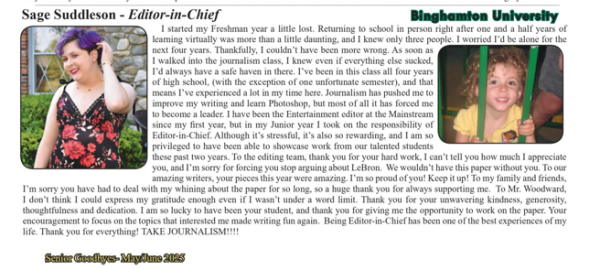AP Exams: May is Almost Here
As we head off to spring break, ready for warm weather, the beach, and relaxation, we mustn’t forget AP exams are right around the corner. For many sophomores, this is your first and only exam, allowing you to dedicate yourself to a world of flash cards and practice tests. For the juniors, this may be the year you face three or more exams, forcing you into hours of studying to work off a stressful year. And for seniors, as “checked out” as we are, this is the final stride in the year and our last chance to earn college credit.
The problem for some students however, is they may not fully recognize the importance and the reality of these exams. The students are taking them with a grain of salt rather than learning their true value. For others, however, the heart of the problem lies in one question: How do you study for an AP exam?
While tutors may be the answer at times, self-studying is the more likely option for most students. This means engulfing oneself in class notes, review books, and flash cards; however, students may still find it difficult to find a study method that works even given the right tools. Thankfully, education consulting company IvyWise provides AP students with tips and tricks to prepare for the big exam in the article “Self-Studying: What’s the Benefit and How to Do It.”
The writers at IvyWise advise that, firstly, one should set realistic goals. As imperative as it may be to devote all of one’s waking hours to studying for exams, just by the nature of being students, we are constantly bombarded by hoards of things to do – going to work, playing sports, and doing homework to top it all off. So, students should work towards achievable goals: Perhaps studying for an hour each night, or aiming to get a 4 on the exam.
The next tip the writers at IvyWise give to students is to create a habit or review material multiple times in a day. After a day at school or after reading a chapter in the textbook, students should review the material by typing up the notes or even by reading them again, allowing the information to resonate. Although it seems like an arduous task, reviewing material now can allow one’s brain to absorb information, cutting down on the amount of time spent cramming the day before the exam.
Lastly, the writers recommend that students study in short, frequent sessions. Instead of treating studying like a marathon, students should view it as sprints, breaking up the information into smaller topics, separated by short, 5-minute breaks following 20-minute study sessions. By doing this, students’ focus doesn’t wane while staring at a computer or a textbook for hours, further allowing the brain to grip the information.
As exams approach, students’ level of stress reaches an all-time high and brings on a mode of panic. Rather than blowing them off and cramming, however, students should follow the tips above and keep in mind that each students absorbs and recalls information his/her own way, so whatever works for one student may not work for another. Good luck!










































